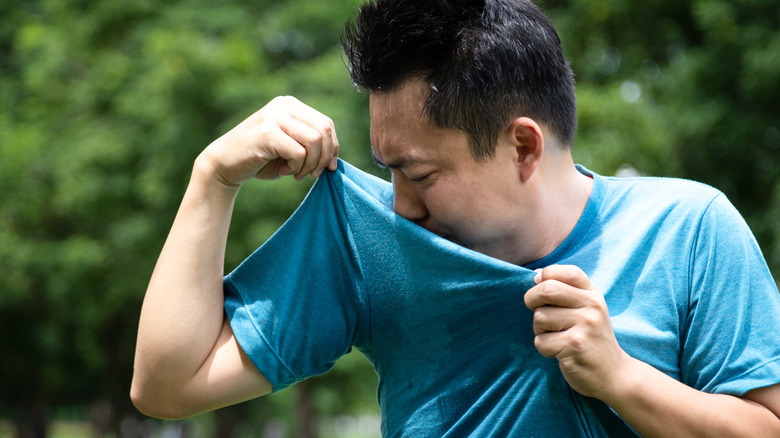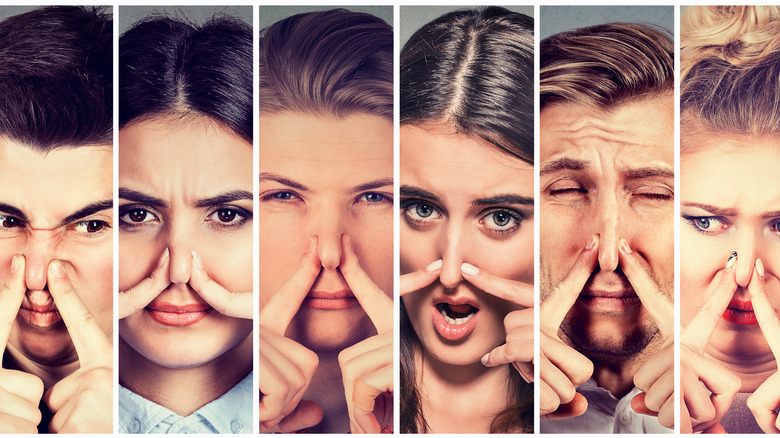Things You Never Realized Were Making You Smell Bad
Don't take this the wrong way, but you smell. We all do. It's just a fact of being human. The smells we emit can reveal a lot about us, even if we're not aware of it.
Your breath and body odors can signal what you've been eating, or can be symptoms of a serious or rare disease. Your scent can be influenced by your age, your mood, or the clothes you wear. The way you smell may even reveal your politics. Research shows that people can identify certain personality traits, like neuroticism or extraversion, based on smell. Body odor can even be used by "nosewitnesses" to identify criminals in a police lineup, as a 2016 study in Frontiers in Psychology highlighted.
Body smells may not be considered a topic for polite company, but we're all friends here, right? So let's take a nosedive into this ripe topic. There's no need to hold your nose; all this information passes the smell test.
Eating spicy food can change your scent
Spicy, strong-smelling foods can tag you with their tang a few different ways. For one thing, the scent of some aromatic spices attach to your tongue and teeth, according to the Cleveland Clinic. This flavors your breath in a way you may not find very pleasant. Garlic and onions release sulfur-like chemical compounds as they're digested, which can also impact the way your breath smells and get released through your pores (the same is true for pungent spices),per Prevention. Food can also make you sweat more if it contains capsaicin, the chemical found in hot peppers (via WebMD).
One way to deal with garlic breath, according to research actually done on garlic breath, is to eat some apple alongside it, per the BBC. Certain chemicals in raw apples seem to neutralize the odor molecules of the garlic. If garlic plus apple doesn't sound appetizing, mint and lettuce can also help.
Cauliflower and related vegetables contain odiferous chemicals
The foods you didn't want to eat when you were a kid — namely cauliflower, cabbage, broccoli and their relatives — are called cruciferous vegetables. Their distinctive flavors may be a welcome addition to a foodie's palate, but when the body digests these veggies, they release pungent, sulfur-containing chemicals. "These compounds are absorbed into the body and secreted in sweat," medicinal chemistry consultant E. Adam Kallel explained to the HuffPost. The accompanying odor can last for up to six hours.
That's no excuse to avoid cruciferous vegetables, though. They're full of fiber, vitamin C, folate, and potassium. They contain compounds that seem to be protective against cancer; studies have suggested that a diet rich in cruciferous vegetables lowers the risk of bladder, breast, colon, lung, and pancreatic cancers (via Cleveland Clinic).
They're also beneficial for heart health, and may help prevent asthma, Alzheimer's disease and some infections, according to an academic review of research on cruciferous vegetables published in the Journal of Functional Foods. You can neutralize their odor-causing properties by parboiling them in water with a pinch of salt, per HuffPost.
Diabetes can cause fruity breath
Sometimes bad breath can simply be from what you ate. Other times, though, it can be more serious. Take "acetone breath" for example. That may sound like a schoolyard taunt, but the fruity, acetone-like scent (think: nail polish) can signal a serious complication of diabetes called diabetic ketoacidosis (via WebMD).
Diabetes is a disorder in which your body doesn't produce, or stops responding to, the hormone insulin. Without insulin, the blood sugar that your body uses for fuel can't get into your cells, and remains in the bloodstream. As a result, your body begins to burn fat instead of sugar. This process causes a build up of acids in your blood called ketones which, among other things, produces the distinct breath odor, per WebMD.
For someone with diabetes, acetone breath may mean something's seriously wrong, warranting a call to the doctor or an ER visit, especially if accompanied by other diabetic ketoacidosis symptoms like unexplained thirst, frequent urination, fatigue, nausea and vomiting, sudden weight loss and lack of sweat. It also can be a sign of undiagnosed diabetes. Other causes of acetone breath include being on the keto diet, fasting, and heavy drinking.
Eating too much meat can affect your body odor
Do carnivores smell bad? As part of a study published in Chemical Senses, researchers tested the effects of meat-eating by having 17 male test subjects follow a controlled diet for two weeks. Some were given meals that included meat entrees every day, while the others had similar meals without the meat. On the last day, they wore cotton pads under their arms for 24 hours to collect their body odor. A group of 30 women then rated the odor of each subject. Odor samples from men on the non-meat diet were rated as "significantly more attractive, more pleasant, and less intense" than samples from meat eaters.
In a 2017 Evolution and Human Behavior study, researchers surveyed men on their eating habits for the previous year, questioning how frequently they ate over 200 different foods. To sample their body odor, the guys wore a T-shirt under their clothes for 24 hours, which were then sniffed and rated by female volunteers. Eating more meat didn't have an impact on attractiveness, but study author Ian Stephan told NPR, "Women basically found that men who ate more vegetables smelled nicer." What's more, this connection held up when the researchers assessed the guys' fruit and vegetable consumption with a device that measures skin hue (because pigments in plants that we eat get deposited in our skin).
When you're stressed, you stink
Not all sweat is created equal. Eccrine glands cover most of our body, and release fluid that cools you down when you're hot. A second type, the apocrine glands, releases a thicker sweat. Apocrine glands are found in spots where body hair grows, like the groin and armpits (via Mayo Clinic). Unless you're Bruce Lee, who had the sweat glands removed from his pits to look better on camera.
The extra fat and proteins in apocrine sweat makes it a prime target for bacteria, who go to town and produce chemicals that cause body odor (via Men's Health). The apocrine glands become active when you're stressed, along with the rest of your fight-or-flight reflex, like a rapid heartbeat. So while gobs of sweat during a workout may not produce much odor, your sweat during an IRS audit could bring on the funk.
Finding a good antiperspirant will help if you're a nervous sweater, as will trimming your armpit hair. By the way, you may be able to blame your ancestors for your funk. "Scientists speculate that we may have evolved to produce this odor during stressful situations as a way to ward off predators," Men's Health explained.
Your armpits can get infected
It's not sweat that makes us stink, it's the bacteria that combines with it (via Mayo Clinic). Sometimes bacteria do worse than that, though, and infect your underarm hair. Underarmologists (okay, fine, dermatologists) call this condition trichomycosis. It doesn't always cause symptoms, but it can produce discolored sweat (red, yellow, or black), excessive sweating and sweat stains, and hair loss as the bacteria destroys underarm hair, as well as heightened body odor, according to Healthline. Small bumps on the affected hair are another clue. Men are more prone to the condition than women, since they're less likely to shave their armpits.
Treatment for trichomycosis is pretty straightforward: Attend to hygiene by regularly washing the area, using an antiperspirant, reducing moisture with a drying powder, and laundering your shirts between uses should clear things up in a few weeks or so. Oh, and you'll need to shave off the affected hair. A doctor might prescribe an antibiotic cream or ointment to rout the bacteria, or in some cases an oral antibiotic (via Healthline).
Sleep apnea can cause bad breath
Morning breath is the worst breath of the day, according to some ad writer somewhere. And sometimes it's a warning sign that you're not getting enough sleep, especially if it's accompanied by snoring at night and sleepiness during the day, reported Men's Health.
You may have sleep apnea, a condition in which you stop breathing during sleep because your airway becomes blocked. This can happen when the muscles of the upper airway relax, keeping air from reaching your lungs, causing you to briefly wake up throughout the night. Along with snoring and restless sleep, other symptoms include gasping or choking sounds during the night, morning headaches, and problems with memory or concentration during the day, per the American Academy of Sleep Medicine (AASM).
Sleep apnea often goes undiagnosed; you might wake up numerous times at night but not remember it. People who are overweight, middle-aged, or male are more likely to have it, according to the AASM. It can cause bad morning breath because it makes you more likely to breathe through your mouth, which makes it easier for halitosis-causing bacteria to breed, explained Men's Health. If you suspect you have sleep apnea, take the AASM's self test and consult your doctor.
If your ears stink, this could be why
Earwax has a smell. In fact, people with different genetic backgrounds have different-smelling earwax, reported NPR. Though you'd probably need to go digging with a Q-tip and take a deep sniff to detect it (ew). However, if your earwax is noticeably rank, it may mean one of a number of ear-related ailments. You might have a blockage of earwax in your ear canal, which can cause an earache and hearing problems as well as smelly wax. Or you might have a full-blown ear infection, especially if the smell is accompanied by pain and drainage.
An object stuck in your ear canal can also cause wax-reek as well as the above symptoms. But, of course, if you jammed something in there, you'd probably know it. Swimmer's ear, an infection caused by water that stays in the ear canal is another culprit. A less familiar cause is a cholesteatoma, which is a benign skin growth that can occur behind the eardrum. Smelly wax is one of the first symptoms (via Healthline).
Whatever the cause, never try to resolve it by sticking anything, including a cotton swab, into your ear canal. Excess earwax is best removed by softening it with an over-the-counter product and flushing it with warm water via a bulb syringe (Harvard Health Letter). See a doctor if you suspect an infection or something serious.
Do your political views stink?
The way you smell to another person may be due, at least in part, to your political beliefs. It sounds hard to believe, but researchers documented this by recruiting 21 people with strong liberal or conservative beliefs to provide body odor samples by wearing underarm pads for 24 hours. They then polled 125 other volunteers on their politics, and had them smell and rate the body odor samples.
People tended to rate the odors as more attractive if they had similar political leanings as the person who provided the sample — even though they had no way of knowing the politics of the odor-donor. In one case, someone whose politics matched those of the donor described the sample as "the best perfume I ever smelled." Someone else, who had the opposite ideology, described the same odor sample as "gone rancid" (via Vox). And in case you're wondering, no one could identify a particular smell as being "liberal" or "conservative." It's a small effect, the researchers say, but could be a reason that people with similar politics are attracted to each other.
You need new workout clothes
If your gym clothes stink, it's not really your fault. Blame the odor-producing bacteria that migrate from your skin to your clothing along with your sweat. By the way, your underarms alone can harbor more than a million bacteria per square centimeter, so you can't really fault them for wanting a less crowded neighborhood.
However, your choice of fabric can impact how well stinky bacteria — let's call them stankteria — are able to grow and proliferate on and in your clothes. In a 2014 study published in Applied and Environmental Microbiology, researchers put this to the test by having 26 men and women complete a bicycle spinning session, then putting their T-shirts in a plastic bag for 24 hours.
Not only did a smell-testing panel rate polyester T-shirts as smelling less pleasant and more intense than cotton shirts, lab tests showed that the synthetic fabric harbored more odor-producing bacteria than the cotton fibers. The malodorous microbes grow better on synthetic fibers, the researches explained, and it seems that the odor molecules themselves attach more easily to cotton fibers, instead of being released into the air as with polyester.
A metabolic disease can produce a fishy or garbage-like body odor
In a person with the rare genetic disorder called trimethylaminuria (TMAU), the body is unable to completely digest certain foods, resulting in the buildup of a chemical that produces an odor resembling rotting fish or garbage. The odor is the only symptom, but it's obviously a distressing one. It can have a serious social and psychological impact (via National Organization for Rare Diseases).
In a study published in The American Journal of Medicine, about a third of people who were struggling with unexplained abnormal body odor had undiagnosed TMAU. People with this condition don't necessarily experience the odor all the time, and it may not be strong, so it's not always an easy condition to identify. However, there is a lab test that can detect it, according to the Monell Center.
Treatment options include avoiding foods affected by TMAU (such as eggs, broccoli, soy, kidney beans, saltwater fish, and organ meats), and taking an antibiotic that will affect bacteria in the gut to keep the odor-causing chemical from being produced.
You smell like fear
In the movies, saying "Careful, they can smell fear!" tends to be useless advice, since it typically refers to an attack dog or a werewolf or some other creature that of course you're going to be afraid of. But it turns out that people, too, may be able to detect the scent of fear.
As part of a study in Neuro Endocrinology Letters, researchers collected odor samples from 42 women who watched either a horror movie ("Candyman") or a neutral film (scenic footage from a train ride). The subjects completed questionnaires before and after the movies to assess if they'd been frightened. Afterwards, odor samples were presented to a second group of 62 women who rated them according to various criteria. The samples that were taken during the horror movie were rated as less pleasant, more intense-smelling, and more "aggressive" compared to samples from the neutral movie.
Notably, the differences in odor rating were not related to people's levels of the stress hormone cortisol during the movies, which was also measured. So it's possible that when we're afraid, we release a chemical "fear pheromone" that's specific to being scared, not just stressed.
How you smell may depend on the sniffer
Is stink in the nose of the besmeller? In some cases, yes. Some men may smell better or worse, depending on who's doing the sniffing. The reason is a chemical called androstenone, a derivative of testosterone, that's present in male sweat. In some mammals, the scent of this chemical conveys social and sexual information (via Rockefeller University).
In humans, the possible role of this chemical is complicated by the fact that it doesn't smell the same to everybody. In a study published in Nature, researchers tested the volunteers' ability to detect androstenone and many other odors. They also took blood samples from the subjects to analyze the genetics relating to odor perception. They found that a single gene affects androstenone perception. People with one version of this gene perceived the chemical as smelling foul or urine-like. For people with a different version of the gene, it smelled more like vanilla, or had no smell at all.
This raises questions about how social signals might be transmitted by androstenone, given that it smells different to different people. "What could be the social and sexual implications of this on one's perception of the smell of fellow humans?" asked study author Leslie Vosshall in a press release.
You'll smell better when you're older
Some things get better with age: Cave-ripened cheeses, fine wines, the auction value of comic books, and apparently, you. Yes, it seems that body odor, too, can become more palatable as we get older.
To study the effect of aging on body scent, a research team took odor samples from young (20 to 30 years old), middle-aged (45 to 55), and senior (75 to 95) men and women. Then a separate group of people rated the odors. It turned out that body odors from the seniors were rated as the least intense of the three groups, and samples from the middle-age group were rated as most intense. Odors from the senior group were rated as less unpleasant than odor samples from the other two age groups.
The odor raters were able to identify which scents came from the oldest age group, but couldn't distinguish the odors of the other two groups. Apparently there is such a thing as the "old-people smell," though it seems to be more pleasant than the scent of younger people.















